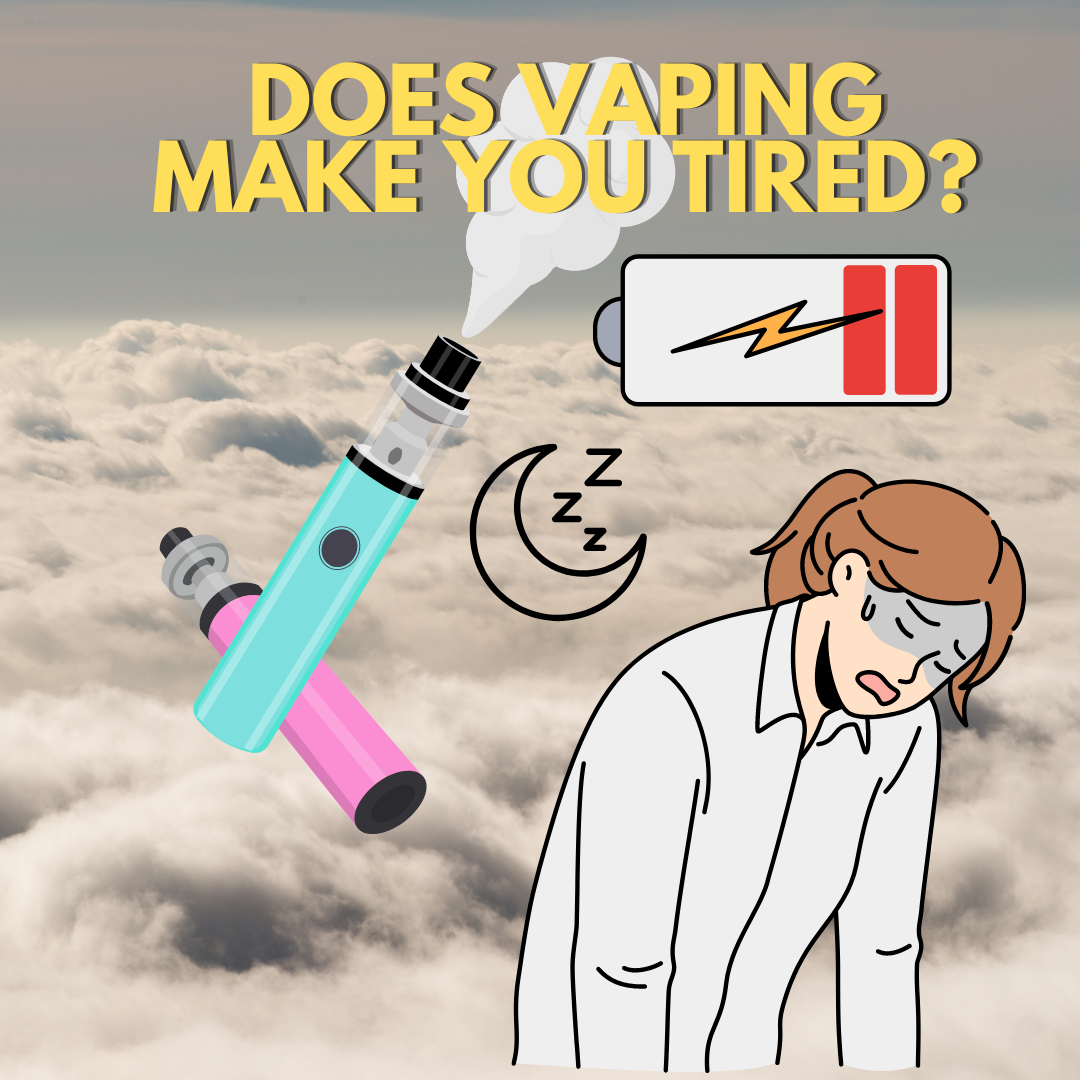
Does vaping make you tired?
Ever asked yourself if vaping makes you feel sleepy? As more people switch from smoking to vaping, it's important to look at how it affects our sleep and energy.
What Does Nicotine Do?
Nicotine is a stimulant, which means it:
- Gets into your brain quickly, making you feel more awake.
- Can make your heart beat faster and increase your blood pressure.
- Was a morning boost for many smokers, but vaping with nicotine keeps this need going.
But here's the twist: even though nicotine wakes you up, it can also make you feel more tired later on.
The Nicotine Twist: Wakeful Yet Tiring
Nicotine messes with REM sleep. REM stands for Rapid Eye Movement, which is a part of sleep where your eyes move quickly even though they're closed. This is the time when you have dreams. While this is happening, your brain is very busy, almost like when you're awake, but your body stays very still so you don't act out your dreams. REM sleep is important because it helps with remembering things, learning, and how you feel emotionally.
When nicotine is in your blood, you don't spend as much time in REM sleep, which means you might not feel fully rested after sleeping, even if you've been in bed all night.
The Cycle: How It Affects Your Day
When your sleep isn't restful, you might feel really tired during the day. To shake off that tiredness, you might end up using more nicotine if you vape. This starts a loop: not-so-great sleep leads to daytime tiredness, and then using nicotine to try to feel more awake. But here's the catch, even though nicotine might seem to give you a boost at first, it can actually make your sleep and energy problems worse over time.
Understanding Nicotine's Half-Life
- Half-Life Explained: Nicotine's effects reduce by half in about two hours. This means if you vape close to bedtime, nicotine will still affect your sleep.
- Plan Your Vaping: Timing when you vape can help reduce its impact on your sleep.
New to Vaping?
- Adjustment Period: New vapers might feel more tired at first because vaping delivers less nicotine than smoking.
- Temporary Phase: This tired feeling is just temporary while your body gets used to less nicotine.
How to Sleep Better
Nicotine-Free at Night: One effective strategy for improving sleep is to use nicotine-free e-liquids or vape disposables in the evenings. By eliminating nicotine from your nighttime vaping routine, you can help ensure that nicotine doesn't interfere with your ability to fall asleep and stay asleep.
Ease into it:
If you're going straight to nicotine-free vape juice seems too sudden, try mixing it slowly with your usual vape juice. Begin by combining them half-and-half, and then, over time, use more of the nicotine-free juice. Doing it this way helps your body get used to less nicotine before bedtime, helping you sleep better without feeling strong cravings or withdrawal.

PUFF ULTRA ZERO Watermelon Slush
Nicotine Withdrawal and Feeling Tired: A Closer Look
When you decide to quit or cut down on nicotine, whether from vaping or smoking, your body goes through several changes. This period of adjustment is known as nicotine withdrawal. Understanding what happens during this phase can help you manage the symptoms better.
Quitting Symptoms: More Than Just Feeling Tired
Nicotine withdrawal can trigger a range of symptoms, making you feel off in different ways:
- Feeling the Urge: You might find yourself really wanting to vape or smoke, even if you’re trying to quit.
- Headaches: It's common to experience headaches as your body misses the nicotine it's used to.
- Sleepiness: Feeling unusually tired or sleepy during the day is a big sign of withdrawal.
- Mood Swings: You might feel more irritable or down than usual.
- Trouble Sleeping: Even though you’re tired, you might find it hard to get a good night's sleep.
- Concentration Issues: It might be harder to focus on tasks at work or school.
Why It Happens: Adjusting to Life Without Nicotine
Nicotine has a powerful effect on the brain, and when you stop using it, your body has to adjust to its absence. Here’s what’s happening behind the scenes:
- Chemical Changes: Nicotine stimulates the release of dopamine, a "feel-good" chemical in the brain. When you quit, your brain has to get used to not having this artificial boost, which can affect your mood and energy levels.
- Physical Adjustment: Your body might have become dependent on nicotine to function normally. As you withdraw, your body struggles to find its balance, which can leave you feeling tired and out of sorts.
- Mental and Emotional Impact: Quitting nicotine is not just a physical challenge but a mental one too. The habit of reaching for a vape can be hard to break, adding stress and affecting your sleep and energy.
Navigating Nicotine Withdrawal
While nicotine withdrawal can be challenging, there are ways to ease the process:
- Stay Hydrated: Drinking plenty of water can help flush nicotine from your body and ease withdrawal symptoms.
- Healthy Habits: Eating well, exercising, and getting enough sleep can support your body through withdrawal.
- Seek Support: Talking to friends, family, or joining a support group can provide encouragement and advice.
- Consider Nicotine Replacement: Products like gum or patches can help manage cravings and withdrawal symptoms.
Conclusion
So, does vaping make you sleepy? The short answer is yes, mainly due to nicotine's effect on sleep and the cycle of tiredness it creates. By understanding how nicotine affects our sleep and managing our vaping habits, we can improve our sleep and feel more energized throughout the day. Making small changes, like switching to nicotine-free vape juice at night, can make a big difference in how rested you feel.
FAQ: Sleep and Nicotine Vaping
Q: Can vaping without nicotine still make me tired?
A: Vaping without nicotine reduces the risk of sleep disruption, as nicotine is the primary cause of sleep issues related to vaping.
Q: How can I avoid feeling tired from vaping?
A: Consider:
- Using nicotine-free vapes at night.
- Limiting vaping sessions as bedtime approaches.
Q: Does nicotine affect everyone's sleep the same way?
A: Individual responses vary, but nicotine generally disrupts REM sleep, affecting overall sleep quality and next-day energy levels.
Q: How long should I wait to vape before sleeping?
A: To minimize sleep disruption, try to avoid vaping at least two hours before bedtime, especially products containing nicotine.
Q: Will quitting vaping improve my sleep immediately?
A: Sleep may initially be disrupted as your body adjusts to the absence of nicotine. However, most people experience improved sleep quality over time after quitting.
Can you bring a vape on the plane?
Author: Joshua Kim, Team Member of Eliquidstop
Hey! I'm Joshua. Over the last five years I have made the switch from tobacco to vapes. I've explored everything from the newest disposable vapes on the market to a wide variety of e-liquid flavors, all while staying up-to-date with the latest trends, news, insights in vaping. Follow for more!
References
https://www.nicorette.com/why-quit-smoking/reasons-to-quit/does-nicotine-make-you-tired/
https://www.innokin.com/blog/does-vaping-make-you-tired

Leave a comment